Pomegranate for Babies : Health Benefits and Precautions

- Can You Give Pomegranate to Your Baby?
- Nutritional Facts of Pomegranate
- Amazing Health Benefits of Pomegranate for Babies
- Precautions to Take While Giving Pomegranate to an Infant
- Guidelines for Making Pomegranate Juice for Babies
- How to Make Pomegranate Puree for Baby?
- How to Prepare Pomegranate for Baby-led Weaning?
- FAQs
As your infant reaches the milestone of six months, the introduction of solid foods becomes pivotal in their nutritional journey. Among the array of food options, pomegranate emerges as a standout choice. Originating from Persia, this semi-tropical superfruit boasts remarkable antioxidant properties, making it a valuable addition to your baby’s diet. Its diverse health benefits render it a magical inclusion in your infant’s meals. Discover how to give pomegranates to babies in a manner that is both palatable and safe, ensuring a delightful culinary exploration for your little one. All your questions ranging from – is pomegranate good for infants to how to prepare pomegranate juice for babies answered here!
Can You Give Pomegranate to Your Baby?
Yes, pomegranate juice for 6 month old baby is recommended. Once he is a little older, this fruit can be introduced as a pulp without seeds. Rich in nutrients and medicinal properties, pomegranate is an ideal food to add a dose of Vitamin A and E, potassium, iron, fibre, folic acid, and minerals. Make sure you include it in your child’s diet regularly to ensure he gets the right balance of nutrition.
Nutritional Facts of Pomegranate
Red in colour, pomegranate is a seeded fruit with smooth and silky skin. The hundreds of reddish seeds inside are the edible parts. Packed with Vitamin C, A, and E, the fruit is high in antioxidant properties that keep free radicals at bay. The fruit also contains necessary amounts of potassium, fibre, iron, folic acid, minerals, and water-soluble Vitamin B complex. The numerous health benefits that the fruit offers make it a superfood for your baby. Make sure you serve it as a juice until he is ready to eat the pulp. Ideally, babies should be ready to eat the pulp after nine months of age. Below is a table that enlists the nutritional value of pomegranate:
| Nutrition Component | Value per 100 g | Nutrition Component | Value per 100 gms |
| Water | 77.93 gms | Energy | 83kcal |
| Protein | 1.67 g | Total Lipid | 1.17 g |
| Carbohydrate | 18.70 g | Fibre | 4 g |
| Sugars | 13.67 g | Calcium | 10 mg |
| Iron | 0.30 mg | Magnesium | 12 mg |
| Phosphorus | 36 mg | Potassium | 236 mg |
| Sodium | 3 mg | Zinc | 0.35 mg |
| Vitamin C | 10.2 mg | Thiamin | 0.067 mg |
| Riboflavin | 0.053 mg | Niacin | 0.293 mg |
| Vitamin B-6 | 0.075 mg | Folate | 38 ug |
| Vitamin E | 0.60 mg | Vitamin K | 16.4 ug |
Amazing Health Benefits of Pomegranate for Babies
Pomegranate has immense nutritional health benefits that will help your child. Here are some essential health benefits.
1. Helps Build Immunity
Is your baby prone to cold and cough? According to research in the Journal of Pharmacognosy and Phytochemistry, pomegranate is sure to help your child develop immunity and fight infections as it is rich in vitamin C (1). Regular intake helps keep the common cold and cough at bay.
2. Fights Bacterial Infections
Pomegranate contains biochemical enzymes that help reduce inflammation by destroying bacterial infections (2).
3. Aids Digestion
Pomegranate is high in fibre and aids in constipation.It is one of the best ways to include fibre in your diet. Pomegranate juice for babies constipation is highly recommended.
4. Eliminates Intestinal Worms
Intestinal worms or parasites reside either in the small or large intestine and multiply by feeding on the nutrients. Pomegranate juice is a great antidote to kill these worms (3).
5. Stabilises Fever
Pomegranate juice not only controls fever but supplies the body with nutrients that reduce it (4).
6. Enhances Brain Development
The nutrients found in pomegranate, such as vitamins and minerals, contribute to the development of a baby’s brain. Regular consumption of pomegranate can support cognitive function and enhance overall brain health in infants.
7. Boosts Bone Strength
Pomegranates are a rich source of essential minerals like calcium and magnesium, which are crucial for bone development and strength in babies. Incorporating pomegranate into your baby’s diet can aid in building strong and healthy bones, ensuring proper growth and development.
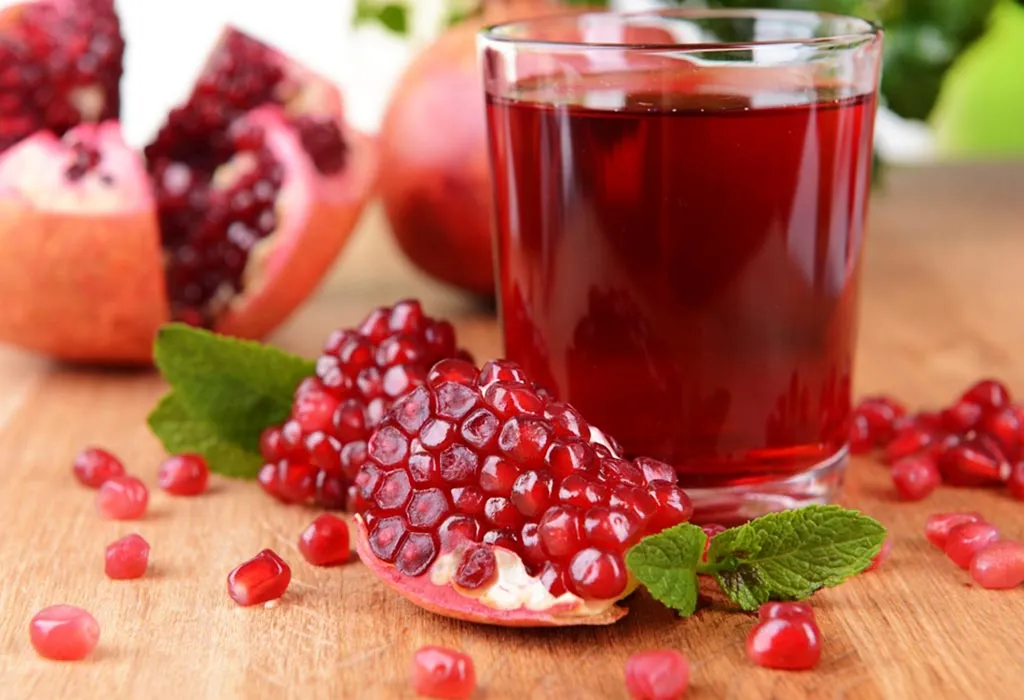
Precautions to Take While Giving Pomegranate to an Infant
Here are some precautions you can take before feeding your little one pomegranate juice or pulp.
- According to the CDC, as seeds are a choking hazard – ensure you do not feed the seeds to your baby (5).
- Do not include the white skin in the juice as it will make the juice sour.
- Consuming pomegranate before sleeping could lead to dental problems.
- Restrict the intake to just about 4-6 oz a day as excess consumption may cause diarrhoea.
- When starting out with pomegranate, do not mix pomegranate with any other food. Monitor your child’s body reaction and response after being fed with the juice or pulp (6).
- Thoroughly wash the pomegranate and ensure proper hygiene while preparing the fruit to prevent any contamination that could cause illness in your infant.
- Before introducing pomegranate to your infant’s diet, consult with your pediatrician to ensure it is suitable for your baby’s age, health condition, and dietary requirements.
Guidelines for Making Pomegranate Juice for Babies
The best way to make pomegranate juice for babies is to deseed the fruit and blend the pulp in a mixer or blender. Strain the juice and collect it. Do not add sugar. Feed the fruit in small quantities to your baby during late morning, afternoon, or evening. Ensure that you give sufficient time when you introduce a new food or vegetable to your baby to check for allergies or to get your baby used to the taste.
How to Make Pomegranate Puree for Baby?
Introducing homemade pomegranate puree to your baby’s diet can be a nutritious and delightful addition. Here’s a simple guide on how to prepare it safely and easily:
- Choose ripe and fresh pomegranates. Look for fruits that are heavy for their size, with vibrant skin and minimal blemishes.
- Wash the pomegranates thoroughly under running water to remove any dirt or impurities. Cut the fruit in half and carefully extract the arils (seeds) from the pulp.
- Place the pomegranate arils in a blender or food processor. Blend until smooth and there are no large chunks remaining.
- If desired, strain the puree through a fine mesh sieve or cheesecloth to remove any remaining seeds or pulp.
- Transfer the pomegranate puree into clean, airtight containers. Store it in the refrigerator for up to 3 days or freeze it in ice cube trays for longer preservation.
- When serving to your baby, ensure the puree is at an appropriate temperature and consistency for their age and feeding stage. You can mix it with other purees or serve it on its own as a nutritious snack or meal component.
How to Prepare Pomegranate for Baby-led Weaning?
Pomegranate is a versatile fruit that can be prepared in various ways suitable for different stages of baby-led weaning. Here’s how you can incorporate pomegranate into your baby’s diet based on their age:
For 6 to 9 Months
- Start by offering whole pomegranate arils to your baby, allowing them to explore the fruit’s texture and taste. Ensure the arils are soft and easily mashable with minimal choking hazards.
- Mash the pomegranate arils with a fork or blend them into a smooth puree to make it easier for your baby to consume. You can mix mashed pomegranate with other soft fruits or yogurt for added flavor and nutrition.
For 9 to 12 Months
- Introduce diced or sliced pomegranate arils as finger foods for your baby to pick up and self-feed. Ensure the pieces are appropriately sized to prevent choking hazards and encourage independent eating skills.
- Mix pomegranate puree or arils into plain yogurt to create a creamy and nutritious snack or meal option for your baby. This combination provides a good source of protein, probiotics, and antioxidants.
For 12 to 24 Months
- Offer pomegranate arils as part of a colorful and nutritious salad alongside other baby-friendly ingredients such as avocado, cucumber, and cooked grains. This introduces different textures and flavors to your toddler’s palate.
- Blend pomegranate arils with other fruits, leafy greens, and yogurt to create delicious and nutrient-packed smoothies for your toddler. This serves as a refreshing snack or meal option while providing essential vitamins and minerals.
FAQs
1. Can I give my baby whole pomegranate seeds?
It’s best to avoid giving whole pomegranate seeds to babies, especially younger ones, as they can pose a choking hazard. Instead, consider mashing or blending the seeds into a puree.
2. Can I mix pomegranate with other fruits or foods?
Yes, you can mix pomegranate with other fruits, yogurt, or cereals to create different flavor combinations for your baby. Just ensure that the other ingredients are suitable for your baby’s age and dietary needs.
3. How much pomegranate should I give my baby?
Start with small amounts, such as a teaspoon or two, and gradually increase as your baby gets used to the taste and texture. Monitor for any signs of allergies or digestive issues and adjust accordingly.
Pomegranate is a wonder food for babies with all the essential nutrients and minerals packed into it. It is one of the healthiest fruits you can include in your baby’s diet once in a while to break the monotony and expand your baby’s food preferences.
References/Resources:
1. Aggarwal. R, Bagai. U; Effect of Punica granatum fruit peel on glucose-6-phosphate dehydrogenase and malate dehydrogenase in amphistome Gastrothylax indicus; JPD; https://www.ncbi.nlm.nih.gov/pmc/articles/PMC5339166/pdf/12639_2015_Article_743.pdf; January 2016
2. Colombo. E, Sangiovanni . E, Dell’Agli. M; A Review on the Anti-Inflammatory Activity of Pomegranate in the Gastrointestinal Tract; Evidence-Based Complementary and Alternative Medicine; https://www.ncbi.nlm.nih.gov/pmc/articles/PMC3612487/pdf/ECAM2013-247145.pdf; February 2013
3. Choking Hazards; Centers for Disease Control and Prevention; https://www.cdc.gov/nutrition/infantandtoddlernutrition/foods-and-drinks/choking-hazards.html
4. Petersen. A, Kleinheinz. A, Jappe. U; Anaphylactic reactions to pomegranate: identification and characterization of eliciting IgE-reactive components (Clinical and Translational Allergy); National Library of Medicine; https://www.ncbi.nlm.nih.gov/pmc/articles/PMC3354222/; August 2011
5. Pomegranate, raw; Food Data Central; U.S. Department of Agriculture; https://fdc.nal.usda.gov/fdc-app.html#/food-details/1102695/nutrients
Also Read:
Oranges for Babies
Peaches for Infant
Dragon Fruit for Infant
Health Benefits of Mango for Babies
Was This Article Helpful?
Parenting is a huge responsibility, for you as a caregiver, but also for us as a parenting content platform. We understand that and take our responsibility of creating credible content seriously. FirstCry Parenting articles are written and published only after extensive research using factually sound references to deliver quality content that is accurate, validated by experts, and completely reliable. To understand how we go about creating content that is credible, read our editorial policy here.








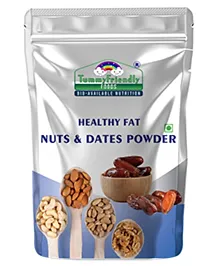
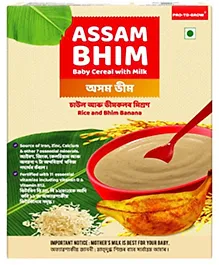
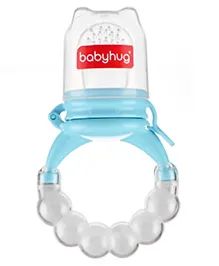
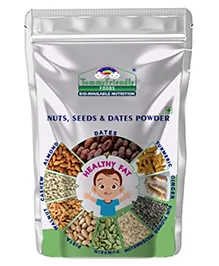
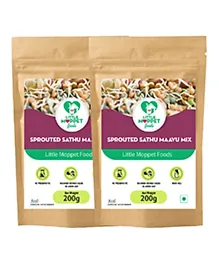
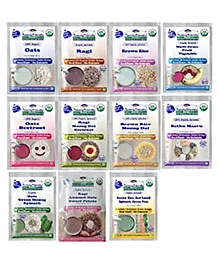
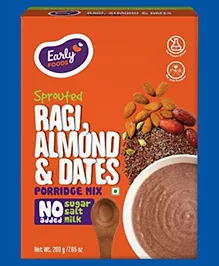

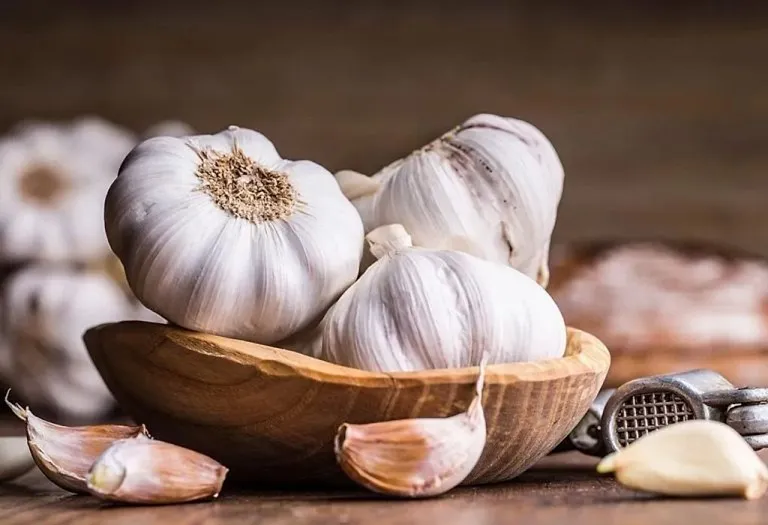
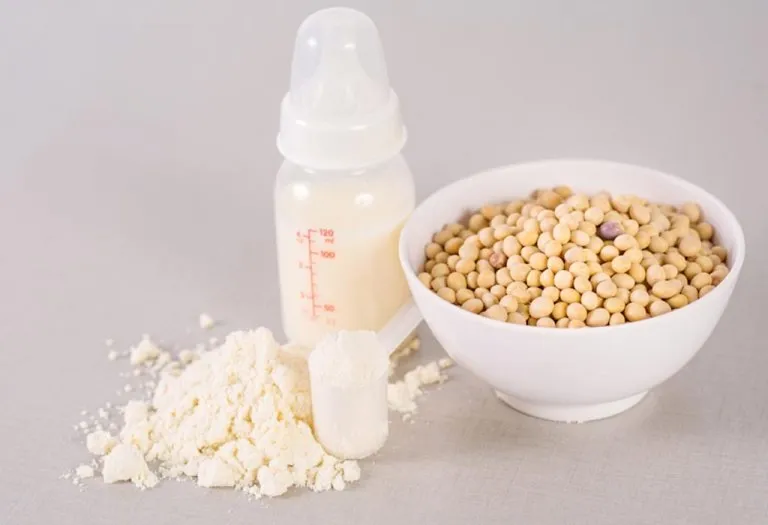


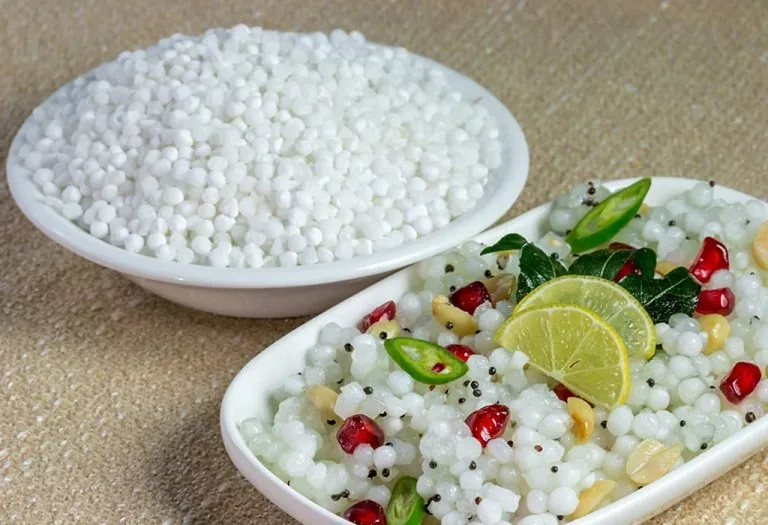

.svg)


















